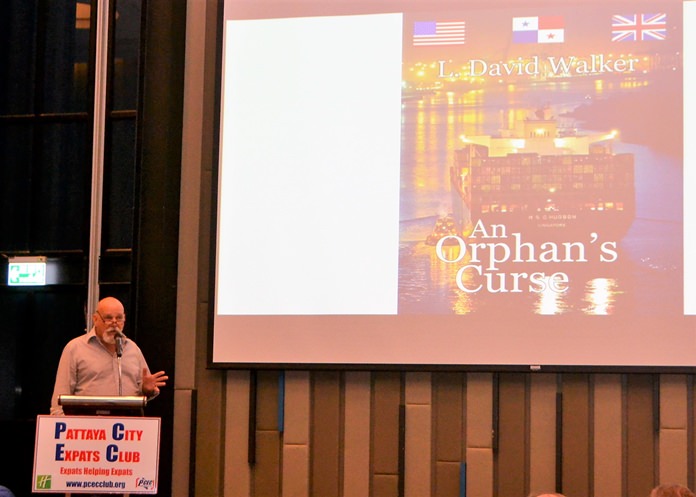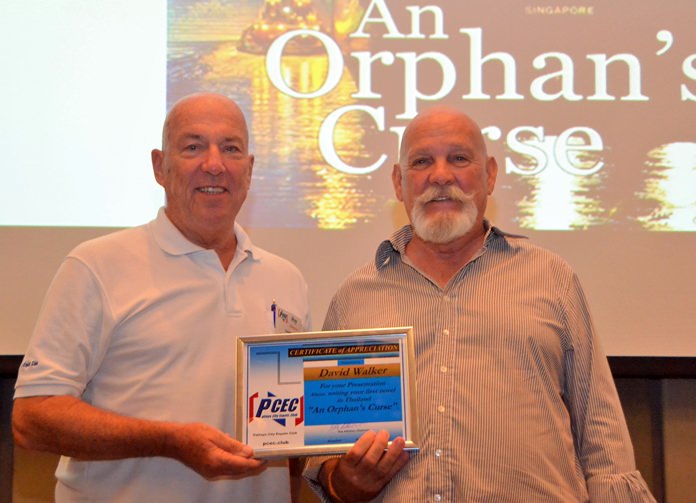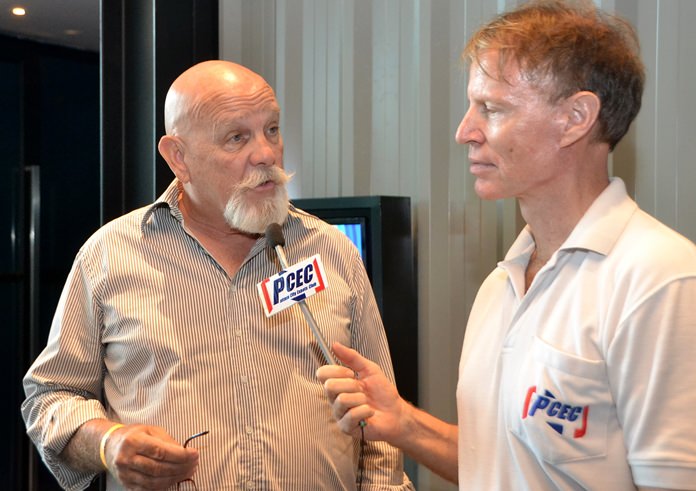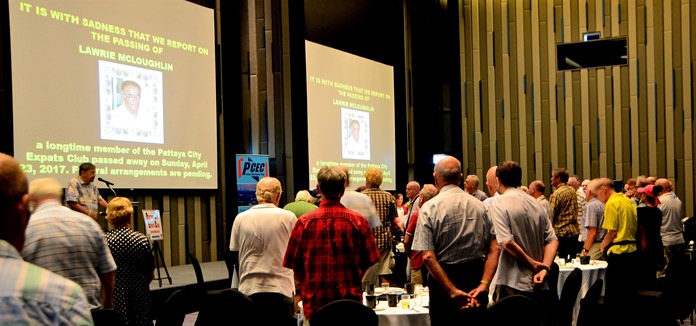You can tell a book by its cover. This was one item Pattaya resident and author L. David Walker provided when he spoke about writing motivations to the Pattaya City Expats Club during their April 30 meeting. He addressed some of the things which motivate people (including himself) to write, some of the different writing processes including what he has found useful, and a bit of trade talk, i.e. what publishers like vs. what authors like.

David is a retired US Army Lieutenant Colonel and Master Aviator with numerous combat aviation command positions and has staff experience throughout the world. He has served as an Instructor Pilot and Tactics Flight Commander at the US Army Aviation Center and has co-authored aviation doctrine.
His book “An Orphan’s Curse” is the first of a trilogy he is currently writing. He donates 25% of the royalties derived from “An Orphan’s Curse” to wounded veterans and their families. David displayed a picture of his book cover and says he disputes the contention, “You cannot judge a book by its cover.” His book cover, he explains, provides everything that one needs to judge its contents. It includes the three flags, depicting the principal players, the flags of the United States, Panama and United Kingdom. The beautiful picture of a container ship, seemingly moving through the Panama Canal (actually, it is a stock a photo of a ship going down the Savannah River, which cost him $250). Then, the title, “An Orphan’s Curse” which describes the antagonist intent, a curse. He notes that the antagonist in his story is a Middle Eastern “orphan” who becomes a terrorist. Much of the action takes place in Panama and also involves CIA operatives and a regimental commander in the British Special Air Service. The eBook is available on Amazon.com along with a brief review and the book cover.

A writer’s process is unique to the writer. The unwritten rule that a goal should be to write 2,000 words a day, Dave feels, is just wrong. If one is compelled into writing that many words, when one may not be “in the mood”, creates garbage and is a waste of time. Instead, he feels that one should write when the mood is right. For example, he may wake up in the middle of the night with an idea and record his thoughts, or perhaps after imbibing a bit or eating a great meal.
He uses a pencil and notepad, a Dictaphone, or his favorite, voice recognition software. He explains that technology has come a long way and that he can express words much more effectively with electronic means, rather than trying to write or type. His favorite writing tool is “Scrivener” for Microsoft Windows, which puts everything he needs for structuring, writing and editing long documents at his fingertips.

David talks about some of the mechanics of writing, including three principals: 1) Develop the characters in great detail, as it pertains to the story line; 2) Plot the story by creating tension, early on; and 3) Solve the problem. Culminate with: good over evil, right over wrong, legal over illegal, etc.
He says that it is not necessary to write sequentially. Write what interests you at the time and the sequencing can be done later. Write about what you know. If you are not knowledgeable of a subject, it will show in your writing. Use a standard font, “Times New Roman”, is the industry standard and use a font size that provides comfort to the reader. The length of the book is also important. It should be between 80,000 to 100,000 words, but there are always exceptions. An active voice is always preferable to a passive voice. It is better to speak in the 1st person (I or we), rather than 3rd person (he, she or it), but it all depends on the subject. He says it is important to foreshadow up front and not ten pages into the book.

Dave provided advice concerning the publishing process. He believes that trying to go directly to a publisher is likely a waste of time and that one needs to use a literary agent, who has access to many publishers. The agent is paid by you but he can provide valuable help with contacts, content and contracts. He also mentioned that he uses Amazon eBooks because he can set the price for his book and receive substantially more royalty than that paid by publishers of “paper” books.
A question/answer session followed with obvious interest by several Expat members/guests. This was followed by the usual Open Forum where questions are asked and answered or comments made about Expat living in Pattaya.
For more information about the PCEC, visit their website at www.pcec.club.




